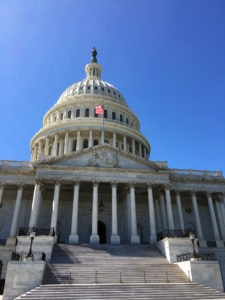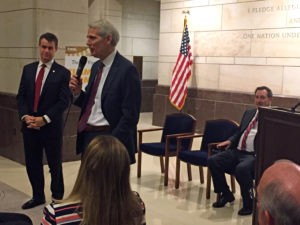The “Tax Cuts and Jobs Act” (H.R. 1) has finally arrived! The long-awaited details – over 400 pages worth – are now out there for all to debate. This is a debate that will play out before the House Republican Ways and Means Committee this week. Much of the public discourse will focus on how it impacts individuals, but for the business community it is the taxation of businesses, large and small, that is of the most significance.
The plan includes a reduction of the corporate rate from 35% to 20%, an important and meaningful step. It also caps the taxation of income derived from pass-throughs (S corporations, LLCs, partnerships and sole proprietorships) at 25%. Key provisions are outlined below. And if you are truly into tax law, the full bill is also available, as is a section-by-section summary.
Now you may note that this legislation is labeled a tax cut, not tax reform. And while many will call it that, it is probably better characterized as a tax cut bill. Cuts are good, and these measures will certainly be the impetus for some level of economic growth. But the trillion dollar questions remain: How much will it spur in gross domestic product (GDP) growth? And, can that realistically be enough to offset the projected reductions in tax collections?
Nobody can really know the answers to these politically-charged questions. But as you read the “scoring” of this legislation (to be published by the Congressional Budget Office after passage out of the House Ways and Means Committee), you may consider these items for context: the GDP growth rate in the United States averaged 3.22% from 1947 until 2017; GDP has pleasantly surprised people by breaking the 3% mark the last couple quarters; and the GDP will probably need to go a good bit higher to prevent the bill from adding substantially to the already staggering federal deficit. So listen for what growth rates are assumed in the projections that will be discussed and debated – and draw your own conclusions.
Key provisions affecting businesses
- Reduces the corporate tax rate: The rate will drop to 20% from the current 35% and is designed to be permanent.
- Establishes a repatriation tax rate: The repatriation rate on overseas assets for U.S. companies would be as high as 12%. The bill also may include a mandatory repatriation of all foreign assets. Illiquid assets would be taxed at a lower rate, spread out over a longer period than liquid assets like cash.
- Creates a 25% rate for pass-through businesses: Instead of getting taxed at an individual rate for business profits, people who own their own business would pay at the so-called pass-through rate. (There will be some guardrails on what kinds of businesses can claim this rate to avoid individuals abusing the lower tax.)
Key provisions affecting individuals
- Creates new individual income brackets:
- 12% for income up to $45,000 for individuals and $90,000 for a married couple
- 25% up to $200,000 individual/$260,000 couples
- 35% up to $500,000 individual/$1 million couples
- 6% over $500,000 individual/$1million couples
- Caps state and local property tax deduction at $10,000, but does NOT cap income or sales tax deductions.
- Eliminates the estate tax: The threshold for the tax, which applies only to estates with greater than $5.6 million in assets during 2018, would double to over $10 million; the plan then phases out the tax after six years.
- Does NOT change taxation of 401(k) plans.
- Increases the child tax credit to $1,600 from $1,000. The bill would also add a credit of $300 for each non-child dependent or parent for five years, after which that provision would expire.
- Limits home mortgage interest deduction: On new-home purchases, interest on loans up to $500,000 would be deductible. (The current limit is $1 million.)
- Nearly doubles the standard deduction: To avoid raising taxes on those currently in the 10% tax bracket, the standard deduction for all taxes would increase to $12,000 for individuals (up from $6,350) and $24,000 for married couples (up from $12,700).
- Eliminates most personal itemized deductions and many credits. The only deductions preserved explicitly in the plan are for charitable gifts and edited home-mortgage interest.
- Repeals the alternative minimum tax (AMT). The tax, which forces people who qualify because of an outsized number of deductions, would be eliminated under the legislation.
Full policy highlights of the bill can be found here.
Keep in mind this is the House’s plan and it will be subject to a different form of scrutiny in the Senate. So regardless all the prior coordination among those working together on this effort for months, some (perhaps many) things will change – they always do!
As for the timeline, it’s hard to say. But we do know that the House Ways and Means Committee will begin hearing amendments this week, and the process could take several days. A vote on the bill by the full House, as it is passed out of Ways and Means, is anticipated to come as early as November 13. From there it goes to the Senate Finance Committee, then full Senate. Optimists hope for something to pass before the end of the year. However, don’t be surprised if the debate isn’t carried over into the beginning of 2018.
Indiana’s delegation members are also weighing in with their views on the new tax bill. Chief among them is Congresswoman Jackie Walorski (IN-02), a member of the pivotal House Ways and Means Committee: “Hoosiers deserve every opportunity to achieve success and live the American Dream, and that’s what tax reform is all about. The Tax Cuts and Jobs Act will help American businesses expand, invest and hire more workers, and it will let middle-class families keep more of the money they earn. It’s time to fix our broken tax code and level the playing field for hardworking Americans by once again making America the best place in the world to do business.”
Resource: Bill Waltz at (317) 264-6887 or email: bwaltz@indianachamber.com

 More than 100 of the state’s top business leaders descended on D.C. this week for the Indiana Chamber’s Fly-in event with our congressional delegation.
More than 100 of the state’s top business leaders descended on D.C. this week for the Indiana Chamber’s Fly-in event with our congressional delegation.
 This year, legislative briefings will be conducted by congressional members, who will be highlighting key public policy areas that line up with their committee assignments and expertise:
This year, legislative briefings will be conducted by congressional members, who will be highlighting key public policy areas that line up with their committee assignments and expertise: Living from one paycheck to the next remains common for a majority of workers – 78%, in fact, compared to 75% a year earlier. And the dilemma impacts more women (81%) than men (75%).
Living from one paycheck to the next remains common for a majority of workers – 78%, in fact, compared to 75% a year earlier. And the dilemma impacts more women (81%) than men (75%).
 Is anything really happening? Yes.
Is anything really happening? Yes. The “Small Business Tax Index 2017: Best to Worst State Tax Systems for Entrepreneurship and Small Business” ranks the 50 states according to the costs of their tax systems for entrepreneurship and small business.
The “Small Business Tax Index 2017: Best to Worst State Tax Systems for Entrepreneurship and Small Business” ranks the 50 states according to the costs of their tax systems for entrepreneurship and small business.
 Protecting and maintaining the rights of taxpayers (as they comply with procedural requirements or seek a determination regarding a tax dispute) became a chief cause of the Indiana Chamber in several cases this session.
Protecting and maintaining the rights of taxpayers (as they comply with procedural requirements or seek a determination regarding a tax dispute) became a chief cause of the Indiana Chamber in several cases this session.